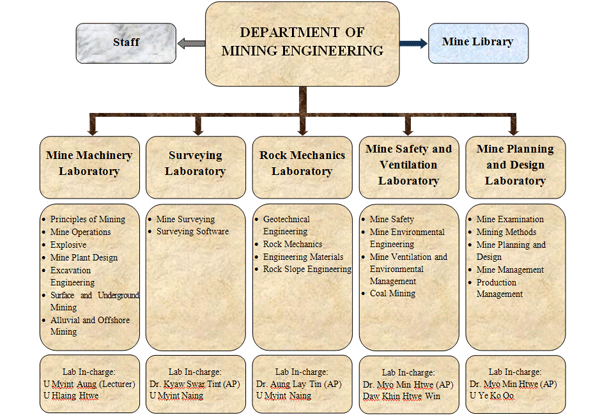Civil

Department of Civil engineering is one of the largest departments which has longest history in the university. Its history started in 1924 as the first and only engineering department of the University of Rangoon, offering a four-year degree course. In 1964, in the newly born engineering university with the name of Rangoon Institute of Technology, the Department of Civil engineering became one of the leading engineering departments in the university. It actively participated in the university development programmes and lent helping hands to other engineering departments. It has long history and many experiences in teaching and consultancy services during the past 50 years. It is involved in some university research works although not comparable to the numerous teaching and consultancy services.
Department of Architecture

Currently, the programme takes six years. The first year may be considered as a foundation course. The next two years are regarded as basic education in Architectural Drawing and Practice with computer application, bringing the student to the stage at which he will be able to contribute usefully to the work in Government offices and construction sites. The next two years are devoted to complex planning problems and advanced courses in the theory of Structures and Building Science working in Architectural Design Studio. Imaginative, scientific and practical studies are required in such courses as Architectural Thoughts and Theory of Design, Professional Practice, Landscape Architecture and Collaborative Design Projects. The students are also required to carry out Measured Drawing of architectural heritage buildings and monuments in Myanmar.
Electronic Engineering

The precursor of the Electronic Engineering and Information Technology Department was the Electrical Engineering Department, which was established in 1958. The Electrical Power Department and the Electronic Engineering and Information Technology Department branched off from it in 1997. Since 2013, the Department of Electronic Engineering has stood as one of the major disciplines among 11 Engineering Departments in YTU. The Electronic Engineering department provides teaching and researche activities mainly in the areas of:
- Microelectronics
- Telecommunication
- Control Engineering
- Signal Processing
- Microprocessor and Microcontroller
Electrical Power

The Electrical Power Engineering Department was established under the Barma Institute of Technology (BIT) as the Department of Electrical Engineering in 1962. At that time, both Electrical Power Engineering and Electrical Communication students had to take the same subjects in the same class up to the fourth year and starting from the fifth year class, they had to take different subjects. In 1965, B.Sc (Engg:) degree was changed to B.E degree and B.E. (Electrical Power) degree or B.E (Electrical Communication) degree was awarded. The first Master of Engineering (M.E.) (Electrical Power) Course was initiated in 1970 in the Rangoon Institute of Technology (RIT) . The first Ph. D. Programme in Electrical Power Engineering was opened in year 2001.
Information Technology

The Department of Electronic Engineering and Information Technology was established at the Yangon Technological University in 1997. Information Technology (IT) Department was set up as a separate one in 2012. IT Department offers three degree programmes and one diploma programme: Bachelor of Engineering, B.E. (IT), Master of Engineering, M.E. (IT), Doctor of Philosophy, Ph. D. (IT) and Postgraduate Diploma in ICT, Dip. (ICT). The duration of Bachelor Degree programme is six academic years (12 Semesters). The Master Degree and Ph.D. Degree programmes are aimed to provide the students with advanced theory, experience in solving complex problems and research training. In addition to formal course work, students are also required to participate in group seminars and monthly departmental seminars.
Mechanical Engineering

In 1938, combined Mechanical and Electrical Engineering Degree Course was introduced. The first B. Sc. Engg. (Mechanical) degree was awarded in 1951-52. The aim of the Department of Mechanical Engineering is to train both undergraduate and postgraduate students to become both theoretically and practically strong engineers who will contribute to the development of the country and its regions. Principles and practice of mechanical engineering are delivered by conducting relevant research and development combined with the best possible education and training.
Mechatronic Engineering

In December, 2013, the Department of Mechatronic Engineering became independent of the Department of Electronic Engineering and Information Technology. The Bachelor’s Degree Programme has a duration of 6 academic years or 12 semesters. The graduate programmes of the Department of Mechatronic Engineering are designed to meet the demands of specialized mechatronic scientists and engineers in the industry. Students in these programmes must demonstrate sufficient competency in mechatronic engineering by satisfying the enhanced coursework requirements in addition to thesis.
Chemical Engineering
- Diploma in Food Technology
- Diploma in Biomass Energy
- Master of Chemical Engineering
- Ph.D Programme
Textile

A textile engineer is defined as one who has had a basic training in engineering to which has been added knowledge of the manufacture of textiles, their properties and uses. This course provides training in basic mechanical engineering subjects, to which is added knowledge of textiles sufficient to prepare the individual for positions in the textile and allied industries which may involve research and engineering principles. It is the belief that the ideal training for the textile industry combines an understanding of textile processing related to all fibres with a sound engineering and scientific background.
Mining
Petrol Engineering
Today, the world is depending on the energy of the petroleum. And petroleum plays a major role in politics, economics, etc of the world. The Petroleum Engineering Department was founded in 1962 under the Mining Engineering Department in Rangoon (Yangon) Institute of Technology, which is now called Yangon Technological University (YTU). Since 1983, Petroleum Engineering Department has been standing as a separate department.
Metallurgical Engineering
The Aims of the Department
- To produce well-qualified and capable metallurgical and materials engineers
- to contribute to the nation’s industrial development and growth.
- To advance research and development in the academic and professional disciplines.
